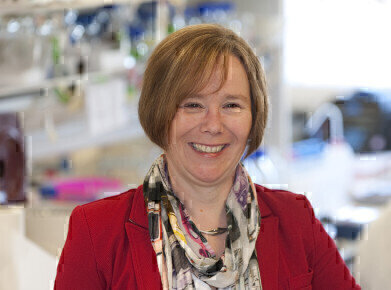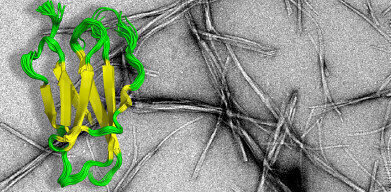-
 Professor Sheena Radford, FRS, Director of the Astbury Centre
Professor Sheena Radford, FRS, Director of the Astbury Centre -
 The image shows the aggregates (grey) that cause amyloid diseases (such as Alzheimer’s) and the protein that forms these aggregates (green and yellow).
The image shows the aggregates (grey) that cause amyloid diseases (such as Alzheimer’s) and the protein that forms these aggregates (green and yellow).
News
Structural Biology Lab Funded by University
Jun 29 2015
The University of Leeds is investing £17 million in a state-of-the-art laboratory for structural biology research. The new facility will provide the University’s internationally renowned Astbury Centre for Structural Molecular Biology with instruments for Electron Microscopy and Nuclear Magnetic Resonance that are competitive with the very best in the world.
Professor Sheena Radford FRS, Director of the Astbury Centre, said: “The biomedical challenges we face today include complex disorders associated with ageing, cancer, lifestyle and drug resistance. To develop new therapies for these diseases, we need to understand biological structures at a molecular level and this investment will keep Leeds at the forefront of this science.”
The funding, approved by the Council of the University of Leeds, will pay for two powerful 300 kilovolt (kV) electron microscopes (EM) that will give researchers new insights into the structure of healthy and diseased cells, and how pathogens like viruses and bacteria attack them. The new microscopes will also allow researchers to solve the structures of individual molecules and the complexes they make in unprecedented detail.
The University will also fund a new, ultra-sensitive 950 megahertz (MHz) nuclear magnetic resonance (NMR) spectrometer which can reveal how biological structures move and interact in real time. This is essential to understand healthy cells and how they malfunction in disease. The new instrumentation will also provide researchers with insights into how to design new drug molecules to target complex health challenges such as cancer, Alzheimer’s disease and antimicrobial resistance.
The new equipment will be housed in fully refurbished facilities alongside existing 120kV and 200kV EMs, and 500, 600 and 750 MHz NMR machines. The existing machines have been purchased and systematically upgraded over the years through a combination of Leeds and Wellcome Trust funding. Work to develop the new BioStructure Laboratory will start immediately.
Professor Radford said: "Structural methods have revolutionised our understanding of biology and our ability to modify it to treat disease, and will continue to do so. Such methods are at the very heart of our centre’s vision of understanding life in molecular detail. The true power of structural biology comes from the integration of electron microscopy and nuclear magnetic resonance spectroscopy with X-ray crystallography and other biochemical and cell biological approaches.”
“Major investments have been made in X-ray crystallography across Europe, such as the UK’s Diamond Light Source, but greater investment in electron microscopy and nuclear magnetic resonance spectroscopy is also required. Applied in combination, these structural methods provide unique insights into the structure and dynamics of even the most complex biological and biomedical systems. This latest investment in Leeds will ensure that we become one of the best resourced centres for instrumentation in structural biology in the world. We are immensely grateful to the University Council for backing the Astbury Centre in this way."
Digital Edition
Lab Asia Dec 2025
December 2025
Chromatography Articles- Cutting-edge sample preparation tools help laboratories to stay ahead of the curveMass Spectrometry & Spectroscopy Articles- Unlocking the complexity of metabolomics: Pushi...
View all digital editions
Events
Jan 21 2026 Tokyo, Japan
Jan 28 2026 Tokyo, Japan
Jan 29 2026 New Delhi, India
Feb 07 2026 Boston, MA, USA
Asia Pharma Expo/Asia Lab Expo
Feb 12 2026 Dhaka, Bangladesh


















